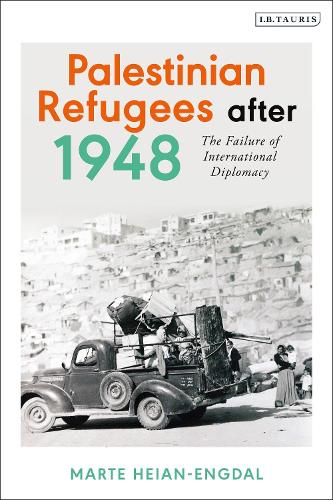
Palestinian Refugees after 1948: The Failure of International Diplomacy
(Hardback)
Available Formats
Publishing Details
Palestinian Refugees after 1948: The Failure of International Diplomacy
By (Author) Marte Heian-Engdal
Bloomsbury Publishing PLC
I.B. Tauris
20th February 2020
United Kingdom
Classifications
Tertiary Education
Non Fiction
International relations
Peacekeeping operations
Peace studies and conflict resolution
305.899274
Physical Properties
Hardback
224
Width 156mm, Height 234mm
490g
Description
After more than seventy years, the Palestinian refugee problem remains unsolved. But if a deal could have been reached involving the repatriation of Palestinian refugees, it was in the early years of the Arab-Israeli conflict. So why didnt this happen This book is the first comprehensive study of the international communitys earliest efforts to solve the Palestinian refugee problem. Based on a wide range of international primary sources from Israeli, US, UK and UN archives, the book investigates the major proposals between 1948 and 1968 and explains why these failed. It shows that the main actors involved the Arab states, Israel, the US and the UN agreed on very little when it came to the Palestinian refugees and therefore never got seriously engaged in finding a solution. This new analysis highlights how the international community gradually moved from viewing the Palestinian refugee problem as a political issue to looking at it as a humanitarian one. It examines the impact of this development and the changes that took place in this formative period of the Arab-Israeli conflict, as well as the limited influence US policy makers had over Israel.
Reviews
Marte Heian-Engdal's book on the multiple failures to address seriously the issue of Palestinian refugees following the tumultuous events of 1947-49 fills an important gap in the literature. The initial reaction of the United Nations was to call for repatriation of refugees or compensation for lost properties of those who chose not to return. A Palestine Conciliation Commission was established to start the diplomatic effort to find an acceptable solution to the refugee problem. But all of this came to naught. Heian-Engdal has thoroughly researched the sources to explain why. Her primary explanation is that the United States, the dominant power concerning this issue in the post World War II period, was never able or willing to devote the energy or resources to forging an agreement between Israel and the various Arab actors, including the Palestinians. A major reason, well before the existence of an organized pro-Israel lobby in the United States, was the presence of important "friends of Israel" around U.S. presidents who were able to exert influence at crucial moments. With the outbreak of the 1967 war, the refugee issue became less important than the state-to-state relations of Israel and its Arab neighbors. This is a sobering and thought-provoking account of an issue that still affects millions of people in the Middle East and has immeasurably complicated the search for a comprehensive Arab-Israeli peace. -- William B. Quandt, Professor Emeritus, University of Virginia, U.S
This is an impressive study well-researched, well-organized, and well-written that surely will make a real contribution to our understanding of the politics of the Palestinian refugee problem. Marte Heian-Engdal has plumbed many archival materials and other hitherto-unused primary sources to focus on a largely under-studied dimension of the problem: the international relations questions surrounding the crucial repatriation vs. resettlement debates that were so important in the twenty years after the 1948 Arab-Israeli War. With discussion of how to resolve the Palestinian refugee plight still relevant today, this book is quite timely, and helps answer why the refugees have continued to languish in exile all these decades -- Michael R. Fischbach is professor of history at Randolph-Macon College in Ashland, Virginia, U.S.A. and author of Records of Dispossession: Palestinian Refugee Property and the Arab-Israeli Conflict
Author Bio
Marte Heian-Engdal is Senior Adviser at NOREF Norwegian Centre for Conflict Resolution, an independent foundation working for the peaceful resolution of armed conflicts. She has worked as Associate Professor in History at the University of Oslo and as Senior Researcher at the Peace Research Institute in Oslo (PRIO).
